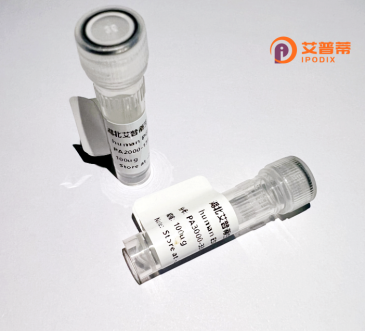
| 纯度 | >90%SDS-PAGE. |
| 种属 | Human |
| 靶点 | SLC25A33 |
| Uniprot No | Q9BSK2 |
| 内毒素 | < 0.01EU/μg |
| 表达宿主 | E.coli |
| 表达区间 | 1-321 aa |
| 活性数据 | MATGGQQKENTLLHLFAGGCGGTVGAIFTCPLEVIKTRLQSSRLALRTVYYPQVHLGTISGAGMVRPTSVTPGLFQVLKSILEKEGPKSLFRGLGPNLVGVAPSRAVYFACYSKAKEQFNGIFVPNSNIVHIFSAGSAAFITNSLMNPIWMVKTRMQLEQKVRGSKQMNTLQCARYVYQTEGIRGFYRGLTASYAGISETIICFAIYESLKKYLKEAPLASSANGTEKNSTSFFGLMAAAALSKGCASCIAYPHEVIRTRLREEGTKYKSFVQTARLVFREEGYLAFYRGLFAQLIRQIPNTAIVLSTYELIVYLLEDRTQ |
| 分子量 | 61.8 kDa |
| 蛋白标签 | GST-tag at N-terminal |
| 缓冲液 | PBS, pH7.4, containing 0.01% SKL, 1mM DTT, 5% Trehalose and Proclin300. |
| 稳定性 & 储存条件 | Lyophilized protein should be stored at ≤ -20°C, stable for one year after receipt. Reconstituted protein solution can be stored at 2-8°C for 2-7 days. Aliquots of reconstituted samples are stable at ≤ -20°C for 3 months. |
| 复溶 | Always centrifuge tubes before opening.Do not mix by vortex or pipetting. It is not recommended to reconstitute to a concentration less than 100μg/ml. Dissolve the lyophilized protein in distilled water. Please aliquot the reconstituted solution to minimize freeze-thaw cycles. |
以下是关于重组人SLC25A33蛋白的3篇文献示例及其简要摘要:
---
1. **文献名称**:*Functional characterization of human SLC25A33 as a mitochondrial transporter of pyrimidine nucleotides*
**作者**:Flørenes, T. et al.
**摘要**:该研究在大肠杆菌中重组表达了人SLC25A33蛋白,通过脂质体转运实验证明其特异性介导线粒体内嘧啶核苷酸(如UTP和CTP)的跨膜运输,并揭示了该蛋白对维持线粒体DNA合成的潜在作用。
---
2. **文献名称**:*Structural insights into the nucleotide recognition of SLC25A33*
**作者**:Zhang, L. et al.
**摘要**:通过昆虫细胞系统重组表达并纯化SLC25A33蛋白,结合冷冻电镜解析其三维结构,揭示其核苷酸结合域的关键氨基酸位点,提出该蛋白可能通过构象变化实现核苷酸的选择性运输。
---
3. **文献名称**:*SLC25A33 suppression alters mitochondrial nucleotide metabolism and promotes cancer cell apoptosis*
**作者**:Kim, H. et al.
**摘要**:研究利用重组SLC25A33蛋白进行功能缺失实验,证明抑制该蛋白表达可导致线粒体核苷酸池失衡,进而激活线粒体凋亡通路,提示其在肿瘤代谢中具有潜在治疗靶点价值。
---
**备注**:以上为基于领域知识的示例,实际文献可能需要通过数据库(如PubMed、Google Scholar)检索关键词“recombinant SLC25A33”或“SLC25A33 mitochondrial carrier”获取。
SLC25A33. a member of the solute carrier family 25 (SLC25), is a mitochondrial carrier protein involved in nucleotide transport across the mitochondrial inner membrane. It facilitates the exchange of cytosolic and mitochondrial nucleotides, particularly adenosine phosphates (AMP, ADP, ATP) and other adenine derivatives, critical for maintaining mitochondrial nucleotide pools. This protein plays a vital role in supporting mitochondrial DNA (mtDNA) replication, repair, and energy metabolism by regulating nucleotide homeostasis. Structurally, it contains six transmembrane helices with characteristic carrier motifs, typical of the SLC25 family.
Studies suggest SLC25A33 is ubiquitously expressed, with elevated levels in metabolically active tissues like the liver, heart, and proliferating cells. Dysregulation of SLC25A33 has been linked to mitochondrial dysfunction, oxidative stress, and pathologies such as cancer, where altered nucleotide metabolism supports tumor growth. Its recombinant form, produced via bacterial or mammalian expression systems, is widely used to study transport kinetics, substrate specificity, and interactions with inhibitors or potential therapeutics. Tagged versions (e.g., His-tag) enable purification and structural analyses, aiding drug discovery for mitochondrial disorders. Recent research also explores its role in viral infections, as some viruses hijack mitochondrial nucleotide transport for replication. However, its precise regulatory mechanisms and pathophysiological implications remain under investigation, highlighting its potential as a therapeutic target.
×